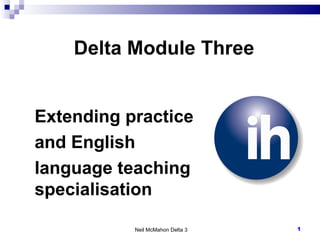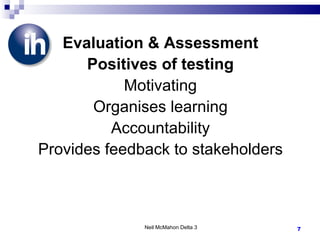Evaluation & assessment
- 1. Delta Module Three Neil McMahon Delta 3 Extending practice and English language teaching specialisation
- 2. Delta Module Three – Evaluation & Assessment Neil McMahon Delta 3 Neil McMahon IH Buenos Aires October 1 2010
- 3. Session Thre e: Fri day October 1st 3 . 0 0 p m – 6 .00 pm Evaluation & Assessment Conclusions Neil McMahon Delta 3
- 4. Evaluation & Assessment In your group discuss the following questions: When do we assess? Why do we assess? What do we assess? How do we assess? Who assesses? www.ih-buenosaires.com
- 5. Evaluation & Assessment Positives Vs negatives of testing Neil McMahon Delta 3
- 6. Evaluation & Assessment Negatives of testing Induces mark-oriented culture Teach exams not language Hinders interaction in class Possibility of failure Deviant parent expectation Neil McMahon Delta 3
- 7. Evaluation & Assessment Positives of testing Motivating Organises learning Accountability Provides feedback to stakeholders Neil McMahon Delta 3
- 8. Evaluation & Assessment Different types of test Neil McMahon Delta 3 a) What can the student do in English? 1 an entry test b) How is the student doing at the moment? 2 a progress test c) What level should the student go into? 3 an achievement test d) What does the student need to work on? 4 a diagnostic test e) How much has the student learned over the course? 5 a proficiency test
- 9. Evaluation & Assessment Different types of test Neil McMahon Delta 3 a) What can the student do in English? 5 a proficiency test b) How is the student doing at the moment? 2 a progress test c) What level should the student go into? 1 an entry test d) What does the student need to work on? 4 a diagnostic test e) How much has the student learned over the course? 3 an achievement test
- 10. Evaluation & Assessment low content validity low practicability low face validity more reliable indirect subjective objective backwash Neil McMahon Delta 3
- 11. Evaluation & Assessment 1 low practicability 2 more reliable 3 indirect 4 low content validity 5 objective (1) and subjective (2) 6 backwash 7 low face validity Neil McMahon Delta 3
- 12. Evaluation & Assessment How do we make tests more reliable? Neil McMahon Delta 3
- 13. Evaluation & Assessment Testing options: Informal Assessment Observation Homework Class participation Class work Neil McMahon Delta 3
- 14. Evaluation & Assessment Testing options: Self Assessment Learner diaries Checklists Can-Do statements Peer-assessed productive tasks Marking own work Report writing Counselling Neil McMahon Delta 3
- 15. Evaluation & Assessment Testing options: Formal Assessment International Tests (IELTS, CPE) Course Book Unit/Progress tests Placement Tests Published Tests Online Tests Institute Tests Self-produced Tests Neil McMahon Delta 3
- 16. Guiding Questions Part 4: Assessment How will you monitor learning progress? Neil McMahon Delta 3
- 17. Guiding Questions Part 4: Assessment How will you assess learning outcomes? Neil McMahon Delta 3
- 18. Guiding Questions Part 4: Assessment What are the assessment principles outlined in the testing literature which will be applied to the assessments? Neil McMahon Delta 3
- 19. Guiding Questions Part 4: Assessment How have these principles influenced your choice of assessments? Neil McMahon Delta 3
- 20. Guiding Questions Part 4: Assessment In what ways, if any, are your choices of assessments constrained? Neil McMahon Delta 3
- 21. Guiding Questions Part 4: Assessment How fit for purpose are the assessments in relation to your learner group and the proposed course? Neil McMahon Delta 3
- 22. Guiding Questions Part 4: Assessment What constraints and opportunities affect the proposed assessment procedures? Neil McMahon Delta 3
- 23. Guiding Questions Part 4: Assessment How will the course be evaluated for future use? Neil McMahon Delta 3
- 24. Evaluation & Assessment How will the course be evaluated for future use? Learner questionnaires about course content, methodology Maintaining field notes throughout the course and referring back to them at the end How far were course goals and objectives met? Informal discussion with learners Surveying results of tests Neil McMahon Delta 3
- 25. Evaluation & Assessment Advice to Candidates It is important for candidates to ensure that their assessment procedures are justified in terms of the course and learner needs outlined in Parts 2 and 3 of the assignment. Neil McMahon Delta 3
- 26. Evaluation & Assessment Advice to Candidates Candidates should clearly show how they intend to make use of formative assessment during their course to monitor learners’ progress, and how the results of this formative assessment might be used to adapt the course content and/or approach. Neil McMahon Delta 3
- 27. Evaluation & Assessment Advice to Candidates It is important that candidates clearly indicate what will be tested when during their course, and that they show how each individual test relates to an overall framework. Sample tests should be included in the appendix. Neil McMahon Delta 3
- 28. Evaluation & Assessment Advice to Candidates Candidates are expected to explicitly refer to principles of assessment with reference to terminology and sources as appropriate, and to show clearly how this understanding has influenced their choice of assessment procedures. Neil McMahon Delta 3
- 29. Evaluation & Assessment Advice to Candidates Some candidates, particularly those who choose the specialism ‘Teaching Exam Classes’, simply justify their assessment procedures by using exam practice tests for example. In such cases it is not sufficient to state that Examination Board tests for the exam under discussion are valid and reliable. Further depth of justification is required. Neil McMahon Delta 3
- 30. Evaluation & Assessment Advice to Candidates Candidates are also expected to indicate, with reference to the literature, how they intend to evaluate their course formatively and summatively. Neil McMahon Delta 3
- 31. Thank you very much. Stay in touch! [email_address] The End Delta Module Three – Evaluation & Assessment Neil McMahon Delta 3































![Thank you very much. Stay in touch! [email_address] The End Delta Module Three – Evaluation & Assessment Neil McMahon Delta 3](https://image.slidesharecdn.com/evaluationassessment-101001085937-phpapp02/85/Evaluation-assessment-31-320.jpg)